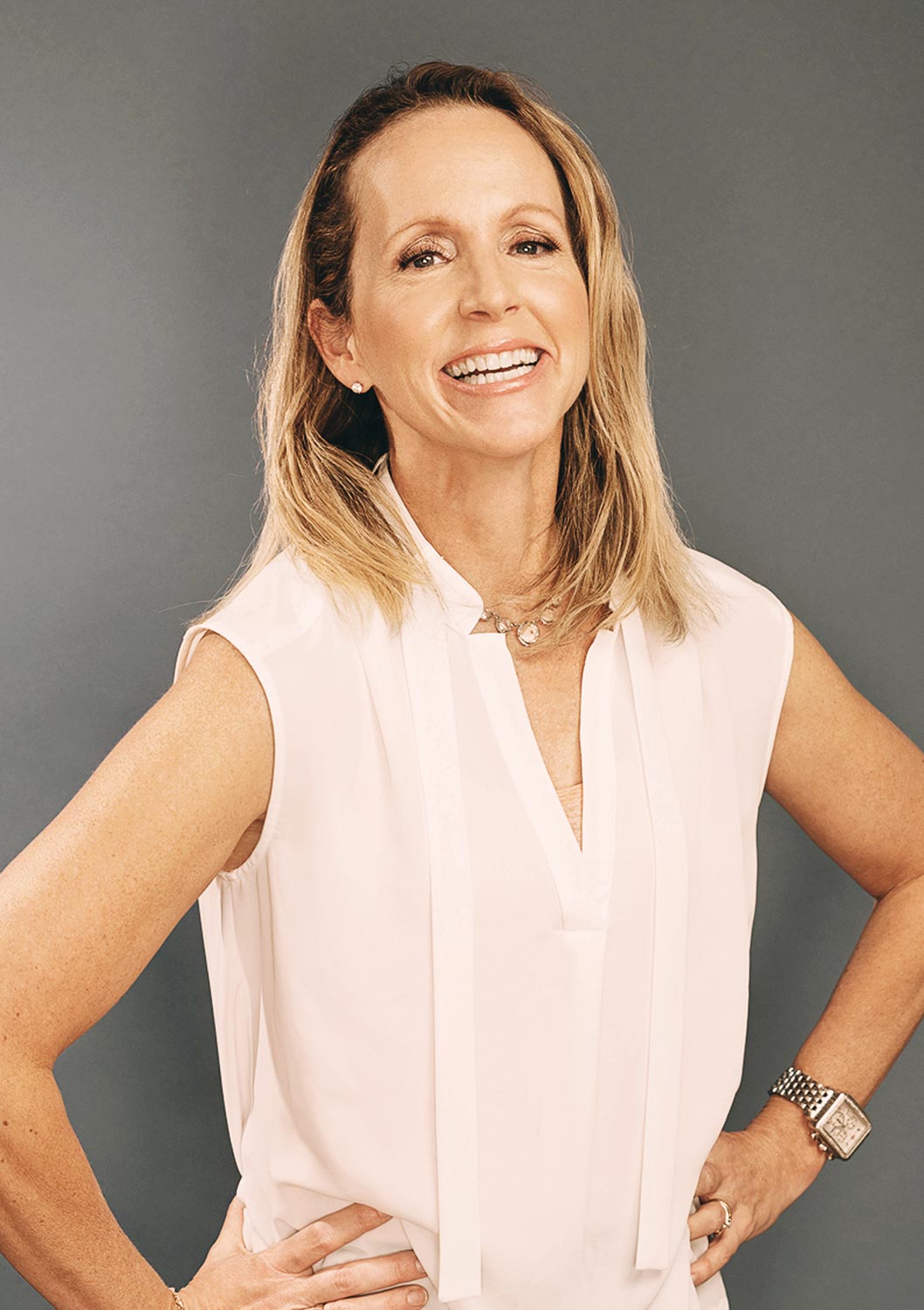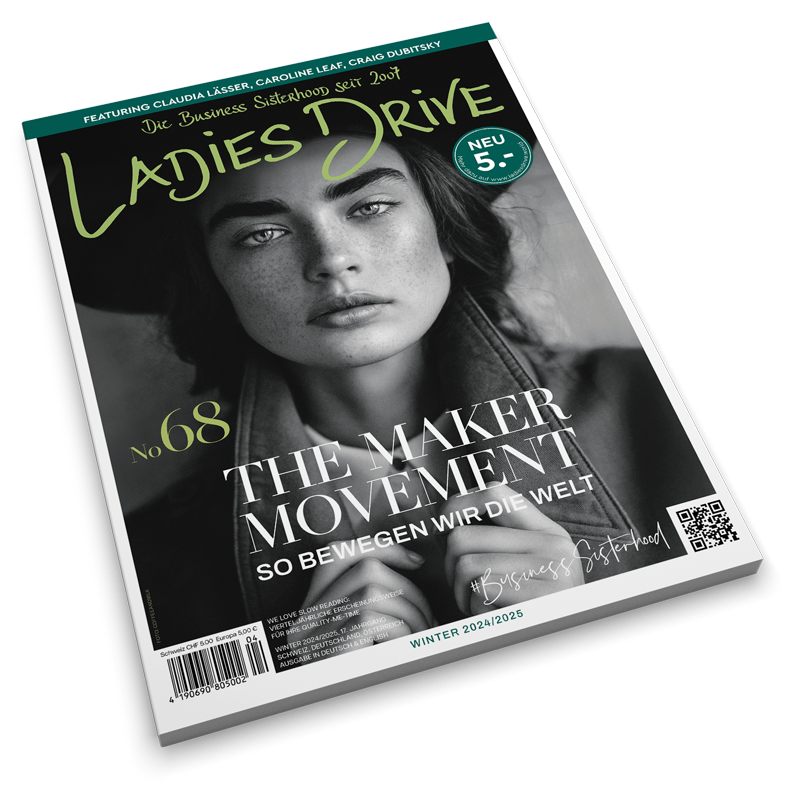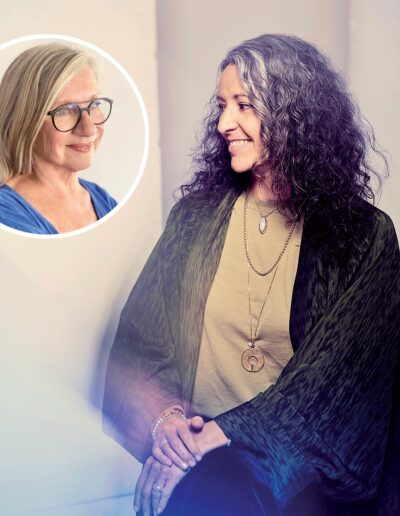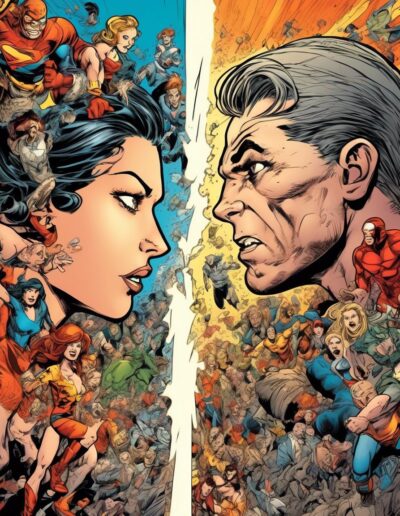Throughout her career, Catherine has served multiple Fortune 500 companies.
Her company WholeLeader has expanded its client base from 6 to 18 companies in three years while doubling revenue. She is on to something. And she is committed to choosing clients based on values as well as value creation.
Catherine’s early career experience in political leadership and polling at the Roper Center for Public Opinion Research gives her a unique perspective on hidden and visible power dynamics within organisations. She seeks to understand what motivates others, identifies stakeholder influences, and recognises who follows and why.
We chat with each other on her 56th birthday. About wholehearted warmth, whole leaders and how to make the combination of standing in strength, vulnerability and empathy make us powerful. And how we can be wildly generous without depleting ourselves – neither at home nor at work.
Ladies Drive: Catherine, you’re successful as an entrepreneur. Are you a superwoman, living the perfect work-life blend?
Catherine Flavin: Successful? Do I feel that way? I feel happier and braver living in my values, skiing on my edges, more comfortable in my own skin, enjoying the journey. Raised up by the stellar people I work with, blessed in a lot of ways. An extraordinary team. Amazing clients. And my amazing children are finding their own ways and I enjoy them so much. The long and very winding road from politics to civic engagement then employee engagement, to consulting and coaching … it all makes sense in my work and my life now. I have crafted that, and that feels good – and I also often feel like I am just getting started because there is always another challenge.
Superwoman I am not. It is tempting, that label, that feeling. Women I work with are incredibly capable. Many of us have a massive capacity for work and organisational skills – prep meals, develop a strategy, solve a problem, also schedule a doctor’s appointment, get to the gym, volunteer, help your brother, and do something else. It’s like a drug where you feel it’s like, oh, I got such a dopamine hit! Because I remember when my kids were little, I could get to New York some days, do a meeting in the morning, be in a suit, and I live about two hours outside of New York, get home and get a kid off the bus and take them to a sporting event. I’d be like: boom, I did it! And then the other day I would try to get myself home to get them off to school in the morning, but I’d land at 1.30 in the morning or something after a flight got delayed. I’d fly to the UK for like a six-hour meeting and try to fly home again. And that sense of superwoman-ness was incredibly unnecessary and also destructive to my well-being. So, I think it’s kind of like a siren. It’s very tempting. And I also think it’s completely diluted and insane.
When you’re doing so much and reinforced for doing so, we condition ourselves to be superwomen and do it all. But no one can. Of course we can’t do it all. If I could eliminate a single construct from the world, it’s that “You can’t do it all” shortcut to the obvious. And our brains shortcut to that when we have a difficult moment or a difficult day. It almost makes women take on more work. And then we end up carrying the domestic load, emotional load, collegial load at work because there’s enough internalised bias that says I exist to support the team. And so, we try to be superwoman and try to take care of everybody’s needs, but it is ultimately not sustainable. It is a corrosive, destructive legacy to pass on. Admitting our limits is a requirement of leading and of being human.
Can you give me an example of what that looks like in your work?
A lot of the regrettable incidents that lead to what we call “issues coaching” come from ignoring our needs and then losing it. Say, for example, you’re a surgeon and you are so devoted to your patients and to your team that you work, work, work. And somehow, you’re on the floor and you’re the only surgeon and you haven’t eaten or gone to the bathroom or whatever. And a tech or a nurse asks you an uninformed question or fails to do their job right, and you bark at them. You are now in trouble. You become the issue. And your refusal to acknowledge your limits, like “I’m tired”, “I can’t do this anymore”, “I need to get something to eat”, or to push back on requests of you, it actually makes that surgeon more vulnerable. So, it’s very interesting … superwoman, doing it all, they are enemies that pretend to be friends.
That’s very nice, very nicely put. Let’s dive into toxic positivity. I can do it all.
It can be toxic, that’s true. When I look at my own development as a leader, staying with aversive emotions was a game changer, not being always positive. I was raised to be just really of service and communal and pleasant. And part of that is my family’s religious upbringing. Part of it is kind of how my mum is wired. And that can be really beautiful. I’ve discerned parts of that that I want to keep now. But there wasn’t a lot of room growing up to say, I don’t feel great, unless it was a physical ailment. Anxiety, insecurity, anger in the face of unfairness or violations. So, we just sort of learn to push through. And, you know, even fitness wise, the 70s or 80s, there was this phrase, “no pain, no gain”. We know better now.
Women have been rewarded for our entire lives for putting communal needs over our own. So, it’s kind of like, take care of yourself while the world sort of tells you to put other people ahead of you. When you put other people ahead of you, just know it’s kind of an internalised bias or wiring. I have a tattoo that is two hearts – and it reminds me now, “How am I going to love you and me through this moment?” so it’s more balanced.
How can we change that as a leader when we’re wired to play a hero? Can we learn to be vulnerable and how can we do that?
We kindly notice whatever the thing is that is habitual and not effective – and then say, “Ah, okay, I did that thing again.” Usually your body tells you that you overstepped a boundary, or the reaction you are getting is not the one you hoped for, intention and impact are not aligned. Like your throat tightens a little bit. Your stomach will tighten, like you brace. Once you start observing yourself in situations where you feel like “going the extra mile”, if you start to pay more attention to the cues from your body (which will flinch before you violate yourself), then you’re less likely to take the bait of the offer to be the hero or heroine or superwoman.
There’s research from Adam Grant on giving and taking that really helped me. Part of a very common learning curve for leaders is learning to give efficiently. So, it’s this: don’t give to the point of depletion. For me, it’s like: “Okay, this person is asking for something. How can I be wildly generous in four minutes? How can I be like really supportive, but also honour the fact that I know I can’t take this on now?” And it might be something like, “I’m so thrilled for you that you’re doing this thing, and I can’t wait to see how it goes, and I wish I could take part, but I just can’t.” Encouraging someone counts as giving. Mirroring their strengths and beauty and contribution is generous. Be attentive to those little moments and try to say physically, how does it feel? Because the emotional intelligence lives in your body. If you’re talking yourself into something and your body is moving away, at least give yourself 24 hours to think about it.
Good point. I’m wondering if vulnerability is always a good thing for leaders, or if it can be harmful as well. How do you view that?
And so, the question of vulnerability is a big one now. We tend to focus on the inadequacy and not knowing, the imperfection, the not being enough as vulnerable. But for our firm, we believe it’s all about this – there is vulnerability in being strong. It takes courage to stand in your own excellence and capacity, and standing up for yourself. Many of us humans tend to be less practiced at that, at letting our contribution be enough.
We are quick with the shortcomings or ways we do not feel like enough – the “I don’t actually know how to do that” part or “I should be better at that.” Or I’m having a weird amount of trouble for an adult female deciding to sit down and finish my taxes. Or I’m procrastinating on meal planning because I’m sick of everything I cook – whatever it is that you feel like you should be able to do that you don’t actually want to do or can’t do.
I said before it is important that you know your limits, you have enough self-awareness to not overextend. There’s a deep, deep difference between experience and expertise. Like yes, you’ve done it, but you are not an expert. So, in the leadership literature, humility, admitting responsibility for mistakes, integrity, those things are wildly important for executives, actually for leaders at all levels, but self-awareness on those things, it takes most of us a really long time to get it. So that vulnerability that you can kind of hold is great.
The part of vulnerability that gets under-assessed and that is a really big differentiator for how I’m trying to drive our firm, is that people have no idea where their particular genius is.
People have no idea where their particular genius is.
They have a very hard time stating: I am actually exceptional at this and I kind of always have been. Like I have a natural aptitude toward this, or I did this thing, and it was pretty amazing. Particularly for women, we get trained to not be too much, not say too much, not self-promote, but that capacity to do good things and the ability to just take it in for a second that you’ve actually had a positive impact and that might be enough for today, that might be enough for the week or the year or the quarter, no one us teaches that.
I’ll give you a really practical example: when I started in leadership development in the late 90s and we did a development plan, I would ask two questions: tell me your strengths and tell me your development opportunities. And the report that we produced would be at least two-thirds on your development opportunities and how to close the gaps. In the way that our team at WholeLeader works now, I know that to have a functional human relationship, we need a 3:1 positive-to-critical ratio. Based on the Gottman research, the best kind of marital relationships or committed relationships have a 7:1 positive-to-critical and in the corporate world, the research is a little bit messy, but we will ask at least five questions on the person’s value, strength, track record, prospective value. And sometimes I have to say to people, if this person got hit by a bus, what would be missing? And they’re like: what? And then they were like: oh, we’d be in so much trouble. And then I would ask them: tell me why? This person is wildly successful on a senior leadership team and does a ton of work, but people are weirdly ungenerous about other people’s gifts and other people’s capacities and also tend to be really hard on ourselves or understate kind of where the capacity of humanity is. And I really hate that. I’m not going to let you get a development plan that doesn’t honour all of your contributions and capacity. But it’s surprisingly hard to get people to not just go to what’s next, what’s the improvement, can I do the next thing?
When we can see both the strength and the imperfection, and understand what others need and offer, we do better connecting. We can contribute and we can value other people’s different strengths and raise our game in relationships.
Your company name is “WholeLeader” – let’s first start with: what is authentic leadership?
So, there’s a lot in that word “authentic”. Can I start with the risks? So, if I look at coaching in general, male or female, there is a derailer that often leaders use: “being who they are” – i.e. authentic – as a justification for being a jerk. Or they will sort of rigidly need to be themselves and that is a very career-limiting behaviour. So, if you say I’m “just being honest because I’m honest” and you’re really hitting somebody with a verbal two-by-four, or they’ll say “I am analytical and like to prepare” and then, when they’re asked a question in a meeting, they can’t answer it and they’ll kind of double down on “that’s just who I am.” So I beg the people I work with to be really, really careful about what they believe about who they are, because sometimes it can be very limiting. Even on things that are personality-based, we have the capacity to grow and act outside our wired preferences. So much of leading is learnable. There are things you or I don’t know yet or haven’t tried yet or are uncomfortable with. So let’s just double down on the capacity to learn, that’s part of it. Please try “that’s how I think of myself so far, and I can evolve and learn.”
Second is, authenticity can be messy for women because of bias. One of my favourite stories, which is funny and also not, is about an executive who became president of the North America part of a global firm. She went to go get a dress for the first event, the question in her head was: “What can I wear to look presidential?” There’s a leadership-is-male bias that lives in a lot of us. If I went shopping and asking myself, “How do I look presidential?” I might come out in a suit, right? And so, she ended up really struggling – unconsciously not being able to find the thing that fit that presidential vibe – and got upsold. She took home a crazy expensive red couture dress that looks to her now like Minnie Mouse. When she came home with it, and her husband was confused, and asked, “Why did you buy that? It doesn’t look like you. I think you would look great in this.” And he pulled another dress out of her closet. He was right. He asked, “What if you just went as you, now a president, and wear what you’re comfortable in?” That kind of reframe helps a lot.
I find a lot of value in questions like these for really high power authenticity, which my colleagues help me frame:
- How do I bring the best of who I am to this moment?
- How do I authentically offer my wisdom and perspective?
- What do I have to contribute?
- How do I show up in this relationship a little more bravely?
- How do I operate in integrity with my values?
The last thing about authenticity is sometimes women are authentic in ways that hurt us because we act as if the world around us were different. There are risks for women that are related to bias – and this point is nuanced. Yes, there is bias in us and in others, and it is almost never just bias. It’s also role understanding, performance, personality, culture, experience as a leader, relationship dynamics, etc. If we push too hard, talk too much or too little, assert too much, that can hurt or not be received – and sometimes it’s true we did and sometimes it’s unfair and biased. Oh well. We need to focus on what we can effect in the environment where we are. Take work-life issues, which are very common. If you are a young working mother, and you work in a company that really values work-life, and where all kinds of people talk about going biking or going home to their families, it’s ok to say: “Hey, I gotta go pick up my kid.” But if you work in a culture where work-life balance is not the primary value, being authentic about that can hurt you. So you might want to be authentic about going home, and decide to be silent about why. One of the banks, there was a team of women interested in our research, and they asked me to meet not on-site, because they didn’t want to draw attention to the fact that they were young mothers. I thought that was super-wise.
When I look at the world that is, there is opportunity and there is also inequity. There’s almost like a Buddhist level of acceptance, I just want you to know it’s there and not take it personally – and together we can chip away at it.
And I am compelled to chip away at these biases in a way that includes all of us, for all of us. Over-association with career happens to men and it is the flipside bias of the motherhood bias. Who belongs in leading? Who belongs in caring roles? We all do. I work with a young father who gives me a lot of hope. He has little kids and a big job, and he’s trying to get home to them, but he feels guilty leaving work. The voice in his head was: “I’m only valuable producing a pay cheque.” That’s rat race nuttiness. A lot of executives, male and female, with way bigger jobs than his, go home for dinner or go to games or tend their elderly parents. I gave him permission to go home and put his kids to bed and read. “The team will be okay, just try.” But he does read to his kids many nights, and talks about it to affect culture – and his team is still killing it.
So that authenticity, wisely managed in reality, is powerful. Just please don’t limit your potential or operate as if you were safe to be 100% you everywhere yet.
Here’s a useful titbit, if you are not sure: women are safest in this zone of highly competent and communal. So, if you’re asking for a raise, you might say, “On behalf of all women in the company, can you assure me that I’m making at least as much as the person (guy) who held this job before?” And in our firm, I’m trying to create safe spaces so that we can bring all of our crazy, awesome accomplishments and joy completely non-judged for being too much. Come be a lot with us, be big and a lot and brave. And I want you to have an invisibility cloak if you need one, or a knife in your pocket to cut through the bologna, or the option to just shrug your shoulders and move on.
So, how do we become a whole leader? Is there a how-to in three steps?
The pre-work is getting your head around this: you, too, belong in leadership at least as much as that guy, and it’s learnable through small deliberate practices that add up over time. So trust that. Take it in, feel it in your body, sit in your chair and relax into knowing it is possible and doesn’t have to be super-effortful.
The second thing I would say is, know your strengths and your user manual. I mean work to really know them, so you can be strategically busy adding value from a place that comes easier for you and valuable to others. Ask other people, what have I done that’s valuable to you? What do you lean on me for? What enables you to succeed when you do? So, it’s this notion of rooting in value, not in doing or being everything. So, your goal is to not be the perfect human or the perfect leader. No such thing. Your goal is to be strategically busy, adding a great deal of value. One exceptional leader calls herself a reinsurance savant. Another one projects revenue like a psychic; what takes her two minutes takes someone else two days. Find your standout strengths that make you additive in the context of your team.
Second, learn to discern what’s important, what actually matters and what doesn’t – and let that stuff go. “Ninja prioritisation” is what one of our LeaderMom exemplars calls it. Get really good at discerning what matters – to the business, to your family, to your relationship, to you. And what is going to have a big impact on the business in six months? What is going to matter at home? What is going to matter for my health?
The next one would be to matter more. When women value ourselves at least as much as we value others, that’s pretty great. That means self-compassion, not martyrdom. It means choosing who gets your energy and who benefits from your talents. It means investing in balanced, mutually caring relationships – friendships, work, romances. It means taking care of your body, and giving time to the people and work that matters to you. It also means having a bouncer at the door of your brain – and being exclusive about whose voices you let in your head. It should be a privilege of friendship to be in there, not open-mic night.
The next one is to really build the team at work and home. We need each other – and relationships make it all worthwhile. So, at home, what can a child do for himself or herself? The idea is to fledge these kids, not to fold their laundry till they’re 40. Share the load at home, share the work, get help. At work, engage others and delegate so you can lead at the right level. “How do I offer my best and bring out the best in other people in service of our common goal?” Doing that is one of the privileges of motherhood. It’s one of the privileges of leadership, which I hope more people remember.
So, the last one is the most important: dare to enjoy it all. Success. Mess. It’s going to be loopy and weird and beautiful, not linear.
Dare to enjoy it all. Success. Mess. It’s going to be loopy and weird and beautiful, not linear.
Prepare for that ride. You will get promoted, and you will eventually get laid off or voted off an island. So I ask you to just exhale and decide you belong. Would you be willing to also commit to enjoy the journey a bit more? Commit to laugh and be light with it, and to learn from successes and mistakes, rest, and go again. We can suffer less at work. We can be less stuck at guilt or anxiety. It is possible to lead and get great results with less crazy and with more love and more joy.

















